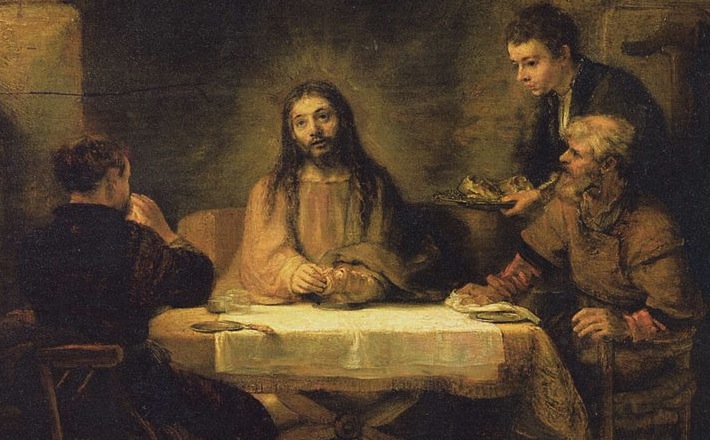Commentary on Luke 24:13-35
Americans have often called the Sunday after Easter the “Low Sunday,” because churches were low in attendance and energy following the Lenten season and Easter celebrations.
This year, when congregations have been worshiping online and regular liturgical rhythms have been disrupted, most have had to reassess their celebrations. What comes after Easter this year?
Today’s passage, Luke 24:13-35, offers a glimpse of Jesus and his disciples after that first Easter. The story begins with two of Jesus’ followers on the road between Jerusalem and Emmaus. One is named Cleopas; the other is not named, and might be Cleopas’ wife.
It is no accident that the first place the Risen Jesus shows up in the Gospel of Luke is on a road. Journeying is a prominent motif throughout Luke’s two-volume work (the Gospel and Acts). Repeatedly, Jesus meets people along the road: the middle section of Luke’s Gospel (the so-called “Travel Narrative”) is structured around Jesus’ journey from Galilee to Jerusalem (Luke 9:51-19:27); Acts says that the first self-designation for the newly-emergent movement of Jesus-followers was not “Christians,” but “the Way” (hodos, Acts 9:2; 22:4; 24:14, 22). The Lukan focus on travel—both literal and figurative—serves as an apt metaphor for discipleship, following in Jesus’ footsteps.
Suddenly, Jesus appears on the road and asks: “What are you discussing with each other while you walk along?” This apparently innocuous question is worth contemplating.
What Cleopas and his companion are discussing is the news, specifically, political news. Jesus has just been crucified, and in the Roman Empire, crucifixion was deeply political. Like many today, Cleopas and his companion have lost hope in the face of this political news; he declares in the past tense, “We had hoped Jesus would be the one to redeem Israel” (24:21). They have heard that Jesus’ tomb is empty (24:22-23), but they do not believe it. The Emmaus road story reminds us that it is directly into a dire political climate—and the hopelessness that tragic political news can engender—that Jesus himself comes along.
Still, they do not recognize him. It is a bit absurd that Cleopas and his friend cannot recognize the man they thought was the Messiah just three days before. The text actually says “their eyes were kept from recognizing him” (verse 16). Who or what “kept their eyes from” recognizing the truth?
We cannot really know. But what if the disciples cannot see Jesus, at least in part, because they think they already understand what is going on? Here’s why I say this: Jesus asks them what they are discussing. Cleopas responds: “Are you the only stranger in Jerusalem who does not know what has happened?” We cannot know his tone, but I imagine a hint of disdain: Are you clueless? How can you NOT know?
What if the disciples cannot recognize Jesus because their opinions are already fully formed? Like all humans, their assumptions shape what they talk about, and what they talk about shapes what they see. Cleopas assumes: 1) that Jesus is clueless, and 2) that his cluelessness makes him a stranger. And not just a stranger, an outsider. One who does not belong.
In Greek, the word for stranger is paroikos. Oikos means “house,” so literally, par-oikos means “outside the house.” This is the same word that is used for someone who lives in a country without citizenship. Cleopas calls Jesus an “immigrant,” a “foreigner.” How often do we, too, assume that we understand and that others are outsiders who do not belong?
What we talk about matters. What we pay attention to grows. The stories we tell confirm certain beliefs and not others. How many of us keep telling the same stories in the same ways to those who already agree with us?
I know I do this. Sometimes, listening to people with whom I strongly disagree makes me anxious or angry. That is especially hard when those folks are friends or family members. So I avoid it. Echo chambers are far more comfortable.
The danger, of course, is that, like Cleopas and his companion, confirmation bias and our own limitations can lead us to miss Jesus altogether. And not just Jesus, but everything the risen Jesus embodies. Hope. New life. The promise that suffering and death are not the end of the story.
The disciples explain—to Jesus—that their leader Jesus has just died on a cross. And then Cleopas says, “Some of the women shocked us by saying his tomb is empty, and others went and verified their story, but they did not see him” (verse 24). Another assumption. Cleopas assumes the women and other disciples who proclaimed that the tomb was empty must be peddling falsehoods because they did not see Jesus.
This is dripping with irony: Cleopas cannot see that he is describing his dashed hopes to the one in whom those hopes are fulfilled. This often happens in Jesus’ parables: The one who assumes he understands is shown to be a fool.
Jesus’ question—“What are you discussing?”—pushes us to pause and pay attention to the stories that we are telling and to the fact that what we discuss shapes what we can and cannot see. Do the things we discuss amongst ourselves (and the assumptions we make when we talk) lead us toward Jesus? Toward wholeness? Away from bitterness? Conversely: what are we not discussing? To what and to whom are we not paying attention, and in our neglect or ignorance, devaluing other travelers on this shared journey?
Jesus asks Cleopas and his companion twice what they are talking about, even though he obviously knows. He is the expert because he is the one who experienced it. What they really need to do is listen to him tell the story. Instead, they discuss someone else’s suffering, assuming they already understand. This ironically leads them to miss the truth, the risen Jesus, when he is right there with them.
Luke 24:13-35 invites us to ask: What are we discussing and how are we discussing it? What are we assuming we understand that perhaps we do not? What if other people are the experts on their own experiences? We follow Jesus’ Emmaus road example when, instead of claiming Mastery, we ask questions and really listen to the answers.
PRAYER OF THE DAY
Mysterious and Divine Presence,
Too often our hearts burn within us because our bodies know before our minds that you are here working in us and through us in this world. Open our eyes, and help us to recognize you in all places and in all people, for the sake of the one whose presence is never far, Jesus Christ. Amen.
HYMNS
I want Jesus to walk with me ELW 325, UMH 521, NCH 490
That Easter day with joy was bright ELW 384, H82 193
Come down, O Love divine ELW 804, H82 516, UMH 475, NCH 289
CHORAL
Come down O love divine, Donald Busarow


April 11, 2021